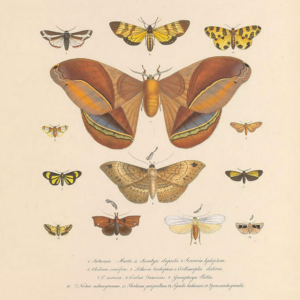By Ângelo Parise Pinto

Image via Biodiversity Heritage Library.
Biological taxonomy, roughly defined as the science of classification, is the most important field for the life sciences mainly for research programs focused on biodiversity, conservation and evolution. Paradoxically the scientific knowledge produced by taxonomists is mistakenly considered intellectually poor, old-fashioned.
Along other fields of the basic sciences, taxonomy suffers with losses of positions, prestige, support, and structure. Collectively all these aspects allied to the biodiversity crisis – high levels of extinction that hampering the humankind to know the extant diversity before it disappears – is known as taxonomic impediment. Recently a potential new attack terrified the community of zoologists around the world due to the suppression of the mega-journal Zootaxa, a leading vehicle in zoological taxonomy, from the Journal Citation Reports (JCR) by Clarivate. The journal alone was responsible for making available a quarter of all new taxa in the last five years, most of them new species.
Together with other 32 journals, among the 12,000 in that database, it would not have received a Journal Impact Factor (JIF) for the current year. This resulted in a reaction from zoologists in worldwide in defense of the journal asking Clarivate to review its decision. A few weeks later the company announced its reinstatement. This event exposed many myths and misuses of bibliometric indexes. The adoption of scientific bibliometric indexes such as JIF has grown hugely and has been adopted by institutions and organizations to objectively evaluate the strongly competitive field of academic careers.
For instance, in Brazil, the Coordination for the Improvement of Higher Education Personnel (Coordenação de Aperfeiçoamento de Pessoal de Nível Superior, CAPES) responsible for evaluating graduate programs, entirely embraced these metrics on its classification. A side effect of the quest and struggle for publishing in high impact journals is the “JIF mania”. A widely perceived crystal-clear impact in the academic careers is that an academic researcher can only evolve in their career by publishing in journals with high JIF values. Taxonomic journals, at least those dedicated to publishing the ordinary taxonomic research executed day-by-day with description of unknown or poorly known organisms, have low bibliometric indexes. In this context, we are intrigued if the suppression of any journal from JCR would really affect the production in the taxonomic field.
Guided by this main question we explore bibliometrics indexes in a recent preprint1 published on the SciELO Preprints server (Are publications on zoological taxonomy under attack?). Our main goal is provoking reflections aiming to shed light on the underlying aspects of bibliometrics indexes, taxonomy, and assessment of academic production, as well as the role of individuals and mega-corporations in this arena. We show that Zootaxa, indeed, has high levels of self-citations and it has its JIF biased by these metrics, however, it’s not necessarily linked with the quality of the research published in the journal. Our conclusion is that taxonomy is produced by taxonomists, not by journals, therefore, taxonomists, instead of focusing on journal metrics endorsing the villainy of policies imposed by dominant companies, should be engaged with renewed strength in actions directly connected to the promotion of this science. I invite you to read the full text in SciELO Preprints.1
Note
1. PINTO, A.P., et al. Are publications on zoological taxonomy under attack? SciELO Preprints [online]. 2020 [viewed in 30 September 2020]. DOI: 10.1590/SciELOPreprints.1164. Available from: https://preprints.scielo.org/index.php/scielo/preprint/view/1164/version/1243
References
CLARIVATE ANALYTICS [social network]. In: @webofscience [online]. Twitter, July 28, 2020 [viewed in 30 September 2020]. Available from: https://twitter.com/webofscience/status/1288103038121648128?s=08
EBACH, M.C., VALDECASAS, A.G. and WHEELER, Q.D. Cladistics [online]. 2011, vol. 27, no. 5, pp. 550-557 [viewed in 30 September 2020]. DOI: 10.1111/j.1096-0031.2011.00348.x. Available from: https://onlinelibrary.wiley.com/doi/full/10.1111/j.1096-0031.2011.00348.x
InCites Journal Citation Reports Help – Title Suppressions [online]. InCites Help. 2020 [viewed in 30 September 2020]. Available from: http://help.incites.clarivate.com/incitesLiveJCR/JCRGroup/titleSuppressions.html
IOANNIDIS, J.P.A. and THOMBS, B.D. European Journal of Clinical Investigation [online]. 2019, vol. 49, no. 9, e13151 [viewed in 30 September 2020]. DOI: 10.1111/eci.13151. Available from: https://onlinelibrary.wiley.com/doi/full/10.1111/eci.13151
PINTO, A.P., et al. Are publications on zoological taxonomy under attack? SciELO Preprints [online]. 2020 [viewed in 30 September 2020]. DOI: 10.1590/SciELOPreprints.1164. Available from: https://preprints.scielo.org/index.php/scielo/preprint/view/1164/version/1243
WHEELER, Q.D. Introductory: Toward the New Taxonomy. In: WHEELER, Q.D. (ed.) The New Taxonomy, Systematics Association Special Volume Series. Boca Raton: CRC Press, 2008.
External link
DORA – San Francisco Declaration on Research Assessment <www.ascb.org/dora/>
About Ângelo Parise Pinto
Ângelo Parise Pinto is Assistant Professor in the Department of Zoology at the Federal University of Paraná (UFPR) since 2017, and Curator of the Invertebrates and Aquatic Insects collections (Departamento de Zoologia da Universidade Federal do Paraná, DZUP). Member of the board of the Brazilian Society of Zoology (Sociedade Brasileira de Zoologia, SBZ) and Brazilian Society of Entomology (Sociedade Brasileira de Entomologia, SBE). He is interested on all aspects of the comparative biology, evolutionary biology, and biodiversity conservation. Teaches classes in the undergraduate course on Biological Sciences and in the Graduate Course on Entomology (PPGEnto – UFPR). Ângelo is also head of the Laboratory of Systematics on Aquatic Insects that focuses on understand patterns and processes which modeled the extant biodiversity. His main projects are on taxonomy, phylogenetic systematics, biogeography and conservation of South American dragonflies and damselflies.
Como citar este post [ISO 690/2010]:











Recent Comments